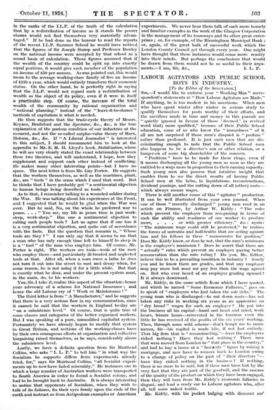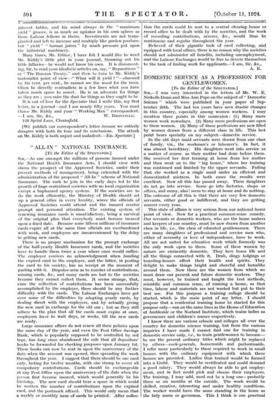LABOUR AGITATORS AND PUBLIC SCHOOL BOYS IN INDUSTRY.
[To the Editor of the SPECTATOR.] would like to endorse your "Working Man" corre- spondent's statements re "How Labour Agitators are Made." If anything, he is too modest in his assertions. When men who have spent winter after winter in serious study to qualify themselves for posts worthy of their efforts, and the sacrifices made in time and money in this pursuit are "quietly ignored in favour of those ' deemed ' (a revived word that) more qualified," because of their Public School education, some of us who know the " inwardness " of it all are not surprised if those men's disquiet is " profane " rather than profound. It is just such men that are dis- criminating enough to note that the Public School man also happens to be a director's son or other relation, or a hanger-on of some big shareholder of the concern.
" Positions " have to be made for these chaps, even if it means discharging all the young men as soon as they are entitled to a wage more in proportion to their earning capacity. Such young men also possess that intuitive insight that enables them to see the direct results of having Public School men at the helm, in liquidations, reconstructions, dividend passings, and the cutting down of all (other) costs— which always means wages.
There is still another cause of this " agitator " production. It can be well illustrated from your own journal. When one of these "recently discharged" young men read in an article on Finance, by Arthur W. Kiddy : "The rules which prevent the employer from recognizing in terms of cash the ability and readiness of one worker to produce more, . . . or with greater efficiency," &c. ; again : "The minimum wage could still be protected," he realises the forces of untruths and half-truths that are acting against him and his fellows in these "manoeuvres for position."
• Does Mr. Kiddy know, or does he not, that the man's minimum is the employer's maximum ? Does he assert that there arc " actually " rules which prevent an employer paying better remuneration than the rate ruling ? Do you, Mr. Editor, believe this to be a prevailing condition in industry ? Surely you and he know there are grades, and that any employer may pay more but must not pay less than the wage agreed on. But who ever heard of an employer grading upward ? It is always downward.
Mr. Kiddy, in the same article from which I have quoted, and which he named "Some Economic Fallacies," goes on to speak of "employers who had taken the sole risks." The young man who is discharged—to out down costs--has not taken any risks in working six years as an apprentice on "dry bread" wages for such an employer ? He put into the business all his capital—hand and heart and mind, work hours, leisure hours—reinvested in the business even the little he has received of the profits of the six years' working. Then, through some wild scheme—don't tempt me to name names, Sir—his capital is made idle, if not lost entirely. That big firm that is "reconstructing,"—have the employees risked nothing ? Have they lost nothing ? Those men that were moved from London to "that place in the country," and had to buy a house at a " humanly " figure by raising a mortgage, and now have to remove back to London owing to a change of policy on the part of "their directors "- have they risked nothing in the business ? If nothing, there is no more to be said, but if these men have lost by the very fact that they are part of the goodwill, and the essence of the quality of the product on which they have been engaged, then they will turn from Mr. Kiddy's economic fallacies in disgust, and lend a ready ear to Labour agitators who, after all, tell some naked truths.
Mr. Kiddy, with his pocket bulging with discount an/
interest tables, and his mind always . in the "maximum yield" groove, is as much an agitator in his own sphere as those Labour fellows in theirs. Investments are not trans- planted and left to increase and multiply like garden produce, but " yield " "human juices" by much pressure put upon the industrial machinery.
Many times, Mr. Editor, I have felt I would like to weed Mr. Kiddy's little plot in your journal, throwing out his little fallacies—he would not know his own. It is disconcert- ing, Sir, to read your idealistic articles on, say, " Reparations " or "The Russian Treaty," and then to turn to Mr. Kiddy's materialist point of view—" What will it yield ? "—obsessed by his cent. per cent., -he cannot see the wood for the trees. Often he directly contradicts in a few lines what you have taken much space to assert. He is an advocate for things as they are ; you raise the dust for things as they ought to be.
It is out of love for the Spectator that I write this, my first letter, to a journal—and I am nearly fifty years. You must blame Mr. Kiddy and your "Working Man" correspondent.
[We publish our correspondent's letter because we entirely disagree with both its tone and its conclusions. The attack on Mr. Kiddy is both unjust and maladroit.—En. Spectator.]











































 Previous page
Previous page